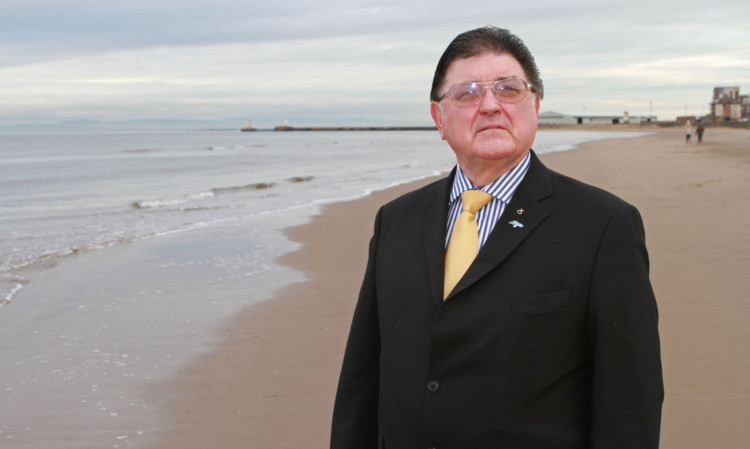
A potential oil boom off the west coast of Scotland was blocked by Westminster defence chiefs.
Declassified UK Government papers from the 1980s show for the first time how the Ministry of Defence was prepared to “pull out all the stops” to prevent any North Sea-style bonanza in the Firth of Clyde.
Ministers at the time said oil firms were “expecting something exploitable” following a series of geological surveys of the area.
But MoD bosses objected to energy giant BP installing drilling rigs in the seas just south of Arran because of fears it would interfere with a vital training and exercise area for nuclear submarines.
Documents from 1983 show how the MoD’s “blanket refusal” to allow test drilling effectively ruled out establishing the full scale of any reserves in the Firth of Clyde.
Chic Brodie, SNP MSP for the South of Scotland, last night accused the UK Government of a “massive cover up”.
He said: “We now have clear evidence the MoD in the early 1980s made it very clear to the Department of Energy it would not tolerate oil drilling and production in the Firth of Clyde.
“This is another McCrone-type deception of the potential use of Scotland’s natural assets.
“I am angry that the people of the West Coast of Scotland, and indeed Scotland as a whole, have been deprived of the economic benefits and income that would have flowed from oil and gas production.”
Last month The Sunday Post reported the claims of David Lambie, a Labour MP in Ayrshire between 1970 and 1992, that he’d been told by key figures in Margaret Thatcher’s Government there was oil in the Firth of Clyde but any further exploration was blocked by the MoD.
Now the claims have been substantiated by a cache of UK Government documents, letters and internal briefings from the early 1980s lodged at the National Archives of Scotland.
The files show three firms, including BP and the then state-owned British National Oil Corporation, undertook seismic surveys in area south of Arran and east of Kintyre in early 1981.
BP then applied for a production licence in the summer of that year for a large area of sea spanning the breadth of the Firth of Clyde.
Letters between the Department for Energy and MoD show defence chiefs asked for no drilling rigs in this area and BP did not pursue its application.
An internal briefing paper from the Industry Department for Scotland in 1984 shows how the department was not told why the application was withdrawn but states “it is a reasonable assumption that opposition from MoD and others (including the Scottish Office) played a large part in the decision”.
A separate document from the Department for Energy states this original plan would have “undoubtedly been the subject of sustained objection from the MoD”.
Speculation over the oil off the Ayrshire coast never went away and in June, 1983 the then Scottish Secretary of State George Younger told The Times newspaper: “The oil companies are playing their cards pretty close to their chests, but they are expecting something exploitable.”
The papers show BP at that time had submitted a revised application for a production licence in a much smaller, 92 square mile stretch of water south of Arran.
A confidential briefing for Mr Younger from November 1983 concedes the “possibility of finding oil or gas in exploitable quantities cannot be confirmed until exploration drilling has taken place” but added the “MoD are known to be very strongly opposed to any drilling taking place in the Firth of Clyde”.
A handwritten note by one of the officials preparing the report said he’d been told by a counterpart in the MoD that “his department’s position was that they saw the Clyde as being of immense strategic importance and that they would pull out all stops to prevent any exploration activity taking place.”
Further documents from 1983 show the Department for Energy asked the MoD to overturn its ban on drilling rigs, which stemmed from the original 1981 BP application, in light of the firm’s revised plans.
The letter to defence chiefs states: “This blanket refusal to agree to any rig under any circumstances rules out testing the area’s hydrocarbon potential and I would expect that only very compelling reasons would lead the MoD to [accept] such a request.”
Five months after this request, a production licence was issued to BP for the revised area but with “restrictions crucially, including no drilling rigs.
Both BP and the UK Government have confirmed that no drilling took place, meaning the full extent of any exploitable reserves in the Firth of Clyde remains unknown.
Labour Peer Lord Foulkes, who at the time was MP for Carrick, Cumnock and Doon Valley, said a constituent approached him with draft maps which showed the geology of the Firth of Clyde indicated major deposits of oil and gas.
He said: “We knew the blockage was down to the MoD so it is nice to be finally vindicated.
“David [Lambie] and myself were pressing hard on this because we saw it as a potential economic bonanza the willing workers, ports, rail and road infrastructure were all there.”

Enjoy the convenience of having The Sunday Post delivered as a digital ePaper straight to your smartphone, tablet or computer.
Subscribe for only £5.49 a month and enjoy all the benefits of the printed paper as a digital replica.
Subscribe